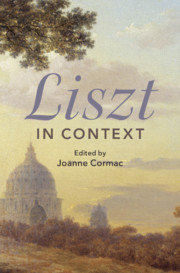Book contents
- Liszt in Context
- Composers in Context
- Liszt in Context
- Copyright page
- Contents
- Illustrations and Tables
- Contributors
- Preface
- Part I People and Places
- Part II Society, Thought and Culture
- Part III Performance and Composition
- Part IV Reception and Legacy
- Chapter 27 Pupils
- Chapter 28 Critics
- Chapter 29 Lateness in Context
- Chapter 30 Liszt and the Twentieth and Twenty-First Centuries
- Chapter 31 Life-Writing
- Chapter 32 Iconography
- Chapter 33 Liszt in Film
- Further Reading
- Index
Chapter 27 - Pupils
Liszt as Teacher
from Part IV - Reception and Legacy
Published online by Cambridge University Press: 23 September 2021
- Liszt in Context
- Composers in Context
- Liszt in Context
- Copyright page
- Contents
- Illustrations and Tables
- Contributors
- Preface
- Part I People and Places
- Part II Society, Thought and Culture
- Part III Performance and Composition
- Part IV Reception and Legacy
- Chapter 27 Pupils
- Chapter 28 Critics
- Chapter 29 Lateness in Context
- Chapter 30 Liszt and the Twentieth and Twenty-First Centuries
- Chapter 31 Life-Writing
- Chapter 32 Iconography
- Chapter 33 Liszt in Film
- Further Reading
- Index
Summary
On a sunny afternoon in the music room of the Hofgärtnerei in Weimar, seven pianists carried out a rite that had naturally crystalized over the last decades: from a pile of scores stacked atop one of two grand pianos, Franz Liszt selected works by Robert Schumann, Fryderyk Chopin, Anton Rubinstein, Jean Louis Nicodé and himself to hear that day. Those compositions had been offered by Emil von Sauer, Maximillian van der Sandt, Alexander Lambert, Georg Liebling, Louis Marek and Augusta Fischer, who in turn played them before Liszt and their peers. For the most part, the seventy-two-year-old master was pleased with the hearings. His student August Göllerich noted how Liszt conducted along while Marek played the Meyerbeer-Liszt Illustrations de l’Africaine, grimaced playfully throughout Lambert’s performance of Rubinstein’s Fourth Piano Concerto and played through almost the whole of Chopin’s third Ballade, during which ‘he exquisitely caricatured the manner in which [the first] theme is played in the conservatories!’1
- Type
- Chapter
- Information
- Liszt in Context , pp. 249 - 257Publisher: Cambridge University PressPrint publication year: 2021



